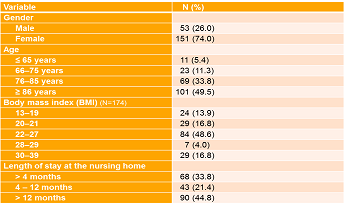
Vigdis Abrahamsen Grøndahl
Østfold University College, Norway
Title: Older people’s involvement in activities related to meals in nursing homes
Biography
Biography: Vigdis Abrahamsen Grøndahl
Abstract
Statement of the Problem: Eating and drinking are fundamental human needs, and consequently essential parts of nursing and nursing care. Therefore and as part of nursing care encouraging older people in nursing homes to engage in different mealtime activities could be one way to increase participation in activities of daily living and more optimal nutrition status
among older people. The purpose of this study is to explore how residents in nursing homes perceive their participation in activities related to food and meals, and possible factors influencing their involvement.
Methodology & Theoretical Orientation: A cross-sectional survey design was used. A total of 204 residents (88 percent) in one Norwegian county agreed to participate and completed a face-to-face interview questionnaire about food and meal experiences. Descriptive and comparative statistics was used.
Results: Close to 30 percent of the residents were vulnerable to malnourishment. None of the residents were involved in menu planning, and more than 90 percent did not participate in food preparation or setting/clearing tables. Ten percent were able to choose where they could eat and five percent when they could eat. Older persons living in nursing homes with more than
80 residents and those younger than 65 years of age, participated the most, while older people with poor appetites were able to choose more often where they wanted to eat, compared to those with a healthy appetite.
Conclusion & Significance: The residents in this study appeared to be vulnerable to malnourishment. The results indicated that they only to a limited extent were involved in activities concerning food and meals at the nursing homes. Management and nurses should focus on residents eating and drinking which are essentials of nursing care. The residents should be asked, if they would like to participate in different mealtime activities. Further, a person-centred care approach that facilitates activities concerning food and meals should be promoted.

Table 1a. Characteristics of the residents (N=204)
Recent Publications:
- Beattie E, O’Reilly M, Strange E, Franklin S, Isenring E (2014) How much do residential aged care staff members know about the nutritional needs residents? International Journal of Older People Nursing 9, 54-64.
- Carrier N, West GE, Ouellet D (2009) Dining experience, food services and staffing are associated with quality of life in elderly nursing home residents. The Journal of Nutrition, Health & Aging 13, 565-570.
- Divert C, Laghmaoui R, Crema C, Issanchou S, Van Wymelbeke V, Sulmont-Rossé C (2015) Improving meal context in nursing homes. Impact of four strategies on food intake and meal pleasure. Appetite 84,139-147.
- Grøndahl VA, Aagaard H (2016) Older people’s involvement in activities related to meals in nursing homes. International Journal of Older People Nursing 11, 204-213.
- McCormack B, Dewing J, McCance T (2011) Developing person-centred care: Addressing contextual challenges through practice development. Online Journal of Issues in Nursing 16(2).

